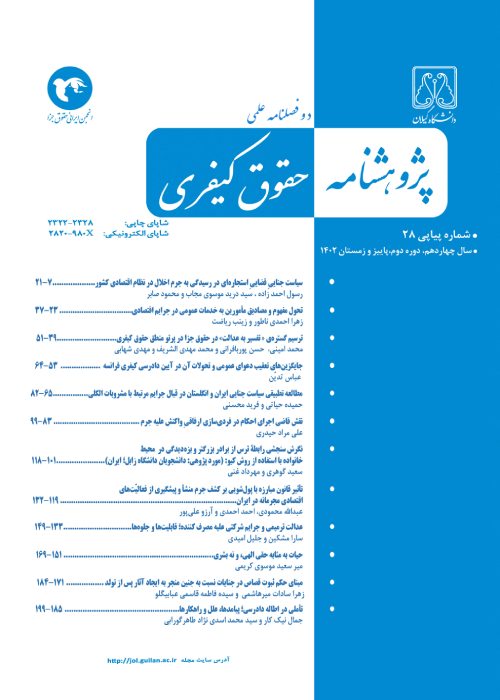Compensation for the victim in the assumption of duty by the officers
The right to life or, in jurisprudential terms, the blood of a Muslim is supported by Islamic jurisprudence and assaulting it, except in specific cases, causes criminal and civil liability. But according to a wrong interpretation of jurisprudence rules, in the regulation, it is seen that against jurisprudence, officers can use military equipment according to the legal duty, except for jurisprudential license and if there is any damage, no responsibility is assumed for the officials or the relevant organization. Such an interpretation is also seen in the judicial procedure; in such a way that if a person is harmed while committing a crime, waived the right to complain and the courts also citing some legal articles or by wrongly inferring from jurisprudential rules, do not consider victim to be entitled to compensation or revenge. Future research with analytical-interpretive method, has examined this legal conflict with jurisprudential rules. By examining jurisprudential and legal documents it was finally clarified, some legal articles in the law on the use of weapons 1373 and the Islamic Penal Code of 1392 is against the jurisprudential standards which in practice has caused the violation of the rights of the victims to get their rights. In this regard, uggestions have been made, including the amendment of Article 3 and Article 6 of the Law on the Use of Weapons, which prescribes the use of weapons in the Ta'ziri crimes, and on this basis, it is suggested in cases where the guilty victim does not deserve to die, compensation should be done by the officer (in the case of fault) or Baitul-Mal(Treasury).
All countries employ police officers to deal with crime and insecurity and grant them the necessary tools and powers according to the law. Since, the police tools may be used to violate the rights of citizens, the adoption of regulation in accordance with international standards and jurisprudential standards (in religious countries) will reduce the wrong use of police tools and endangering the personal and social security of citizens. Therefore, these regulation should clearly and unambiguously predict the correct way of using police tools and equipment and in case of mistake or intentionality of the police officer, he should be dealt with according to the regulation. In Iran, like in other countries, the use of tools and weapons by police officers is expected to deal with accused and criminals. The challenging point of this research is the cases where the police officer causes injuries to the citizens while performing his duty, but the victim does not complain with the idea that he was at the time of committing the crime and is guilty or despite the complaint, the courts also citing some legal articles or by wrongly inferring from jurisprudential rules, do not consider victim to be entitled to compensation or revenge. This is while Islamic teachings have clearly explained the examples of wasting Muslim blood and similar rules, that if it is properly considered in the approved regulation and judicial opinions, the issuance of fair judgments will not be far from reach.
Based on this, in the upcoming research, this issue will be investigated that although a person is committing a crime and violating the prevailing regulation, But other than some specific crimes, his blood is protected by the legislator and should not be subjected to some attacks. On the other hand, police officers have the duty of dealing with disorder and crimes and in some cases, they are obliged to use their police equipment, especially weapons and they may cause injuries to people who are committing crimes as a result of using it that the damage is not proportional to the crime committed, while the officer has done his duty. Of course, in some cases, they may have performed their duties incorrectly. The important question here is that if a citizen is committing a crime, and a police officer shoots at him, is the citizen entitled to a complaint and compensation? Another question in this regard is if the police officers fulfill their legal duty and the victim is not legally entitled to death or physical injury, What is the solution to compensate the victim? Hence, according to these questions, according to the order of being a victim and the ability to compensate for the damage (1), the victim's actions against him/herself (2), the victim's disregard for the warning (3), the confrontation of the victim's negligence or fault and the officers' blame (4) and not wasting the victim's blood and the responsibility of Baitul-Mal (Treasury) (5) is investigated.
This article with a descriptive-analytical method, examines the compensation of the guilty victim in the assumption of duty by the officers.
According to the legal duty, police officers can use police tools and equipment if necessary. Therefore, if the defendants resist or escape, it may result in physical injuries and death. What is inferred from the relevant regulation, especially the law on the use of weapons, is that police officers are not responsible if they cause injuries by following the mentioned laws and the guilty victim also has no right to claim retribution or compensation. Such an argument can also be seen in the judicial procedure and many decisions have been issued by the courts that the guilty victim is not considered entitled to file a complaint by citing some jurisprudential rules such as Mehdur al-Dam, action against himself or a warning. But in this research, It was investigated and found that the jurisprudential term of Mehdur al-Dam has a specific definition in jurisprudence and the Islamic Penal Code of 1392 and its development is against Islamic jurisprudence. In other words, committing the Ta'ziri crimes as well as some Haddi crimes and crimes against physical integrity is not a reason to consider a person's blood as a waste. Another point is that such cases are not covered by the rules of action against oneself and warning and as a result, in some cases, the officers can be held responsible. Because in the rule of action against oneself, the fault or intention of the victim must have broken the causal relationship between the actions of the officers and the crime so that it can be considered ongoing. The rule of warning cannot allow shooting against the victim, even if she heard the warning, because this rule refers to unintentional crimes. In addition, with a warning, regardless of the type of crime and other conditions, the victim cannot be denied the right to file a complaint. Therefore, according to other jurisprudence rules, if the crime against the victim is intentional, the right to demand retribution is established, and if it is unintentional, the right to demand compensation is fixed.
Considering that the guilty victims, in cases that are not Mahdur-Al-dam, and especially that they are committing petty and Ta'ziri crimes; in the first stage, even if the citizens are accused, in order to protect their lives, The use of force by police officers should be limited and in exceptional cases. In the next stage, if the duty of the police officers leads to bodily harm to the guilty victims, Compensation for his damage is more consistent with the teachings of Islamic jurisprudence. In this regard, according to the legal deficiencies, it seems necessary to amend the articles of the law on the use of weapons approved in 1373 such as articles 3 and 6 that prescribe the use of weapons. These legal articles have prescribed the use of weapons in crimes such as arresting a thief, escaping the accused and a prisoner (who has committed a crime other than Article 302 of the Islamic Penal Code approved in 1392), entering and leaving the border, and fleeing cars. So that, In this way, the rights of citizens, even if they are accused, are respected. Another point is that the note to Article 473 of the Islamic Penal Code approved in 1392 should also be narrowly interpreted and considered it to include only military prohibited places in which case, things like the street, road, border, or moving cars will be out of its scope. Of course, until the relevant regulation are reviewed, in cases where police officers perform their legal duties, while warning not to use weapons even if possible, It is possible to assume the responsibility of paying compensation to Baitul-Mal due to the clarity of the Islamic Sharia and the opinions of jurists. In addition, the injured person was not legally entitled to the crime. In other words, with the narrow interpretation of the note of Article 473 as described above, according to the aforementioned article, in the event of the death or injury of the guilty victim, compensation will be the responsibility of Baitul-Mal. It is worth mentioning, in the case of intentional crimes, the situation is clear and the police officer will be responsible according to the law. In non-intentional crimes as well, if the fault of the officers is evident, the guilty person must compensate.
- حق عضویت دریافتی صرف حمایت از نشریات عضو و نگهداری، تکمیل و توسعه مگیران میشود.
- پرداخت حق اشتراک و دانلود مقالات اجازه بازنشر آن در سایر رسانههای چاپی و دیجیتال را به کاربر نمیدهد.




